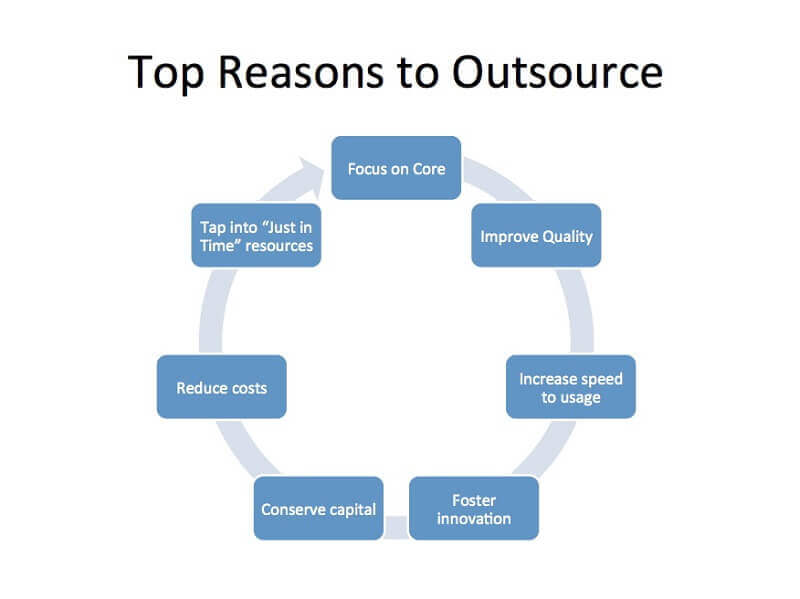Companies are constantly looking out for new ways to improve efficiency, reduce costs, and increase profitability, in the contemporary business world. Outsourcing is one strategy that has gained popularity in recent times.
Outsourcing is immensely popular in businesses due to several factors. Firstly, by outsourcing, we can make notable cost savings. Third-party service providers can provide services at a lower cost, especially for specialized or non-core functions. Secondly, outsourcing company provides access to skills and knowledge that are not at their disposal in-house.
Finally, outsourcing provides businesses with increased flexibility and scalability. Therefore, allowing companies to work according to changing market conditions. post will answer the question of why companies should outsource functions and provide an overview of the benefits of outsourcing.
Why Companies Should Outsource Functions

The purpose of this blog is to provide an overview of the six key reasons why businesses should consider outsourcing functions. These reasons include:
- Cost reduction
- Access to expertise
- Scalability
- Focus on core business functions
- Risk mitigation
- Improved flexibility
This blog helps readers understand these benefits, businesses can make informed decisions about whether outsourcing is the right strategy for their specific needs.
Cost Reduction

One of the primary reasons that businesses turn to outsourcing is cost reduction. By outsourcing functions to external service providers, businesses can achieve significant cost savings.
Furthermore, external vendors can often provide services at a lower cost than in-house staff, particularly for specialized or non-core functions. Additionally, Outsourcing helps companies save extra costs like rent, utilities, and office supplies
Some examples of specific cost savings that businesses can achieve through outsourcing include:
- Reduced labor costs
- Lower infrastructure costs
- Reduced overhead cost
Access to Expertise

Outsourcing provides companies with access to specialized skills and knowledge that may not be available in-house. Furthermore, external service providers have a deeper level of expertise in required fields. Thus, service providers can aid businesses with access to the latest technology, tools, and methodologies.
By outsourcing functions such as IT support, software development, marketing, from the expert external vendors, businesses can improve the quality of their products or services.
Some examples of specific areas of expertise that businesses can access through outsourcing include:
- IT support and software development
- Marketing and advertising
- Accounting and finance
Outsourcing helps businesses refine the quality and efficiency of their operations by accessing the expertise of service providers. By leveraging the specialized skills and knowledge of external vendors, businesses can streamline their processes, reduce errors, and improve the overall quality of their products.
Outsourcing also helps companies stay up–to–date with the latest trends in the market and best practices in their industry. Thus, leading to continuous improvement and innovation. The scope of outsourcing covers a wide range of services such as IT, accounting, payroll, customer service, and logistics. This enables businesses to customize their operations to meet their specific needs and goals.
Scalability
Outsourcing provides businesses with scalability. Thus, allowing them to adapt to changing demand and scale their operations up or down as needed. Additionally, external vendors can often provide services on a flexible basis, allowing businesses to adjust their resource allocation according to their needs.
Furthermore, by outsourcing functions such as customer service or manufacturing, businesses cut down the costs and risks associated with hiring and training new staff. Instead, businesses rely on the expertise of external vendors to meet their changing needs.
Lastly, outsourcing can help businesses adapt to changing demand. Some examples of how outsourcing can help businesses adapt to changing demand include:
- Customer service
- Manufacturing
- IT support
Focus on Core Business Functions

Outsourcing non-core functions can free up resources and allow businesses to focus on their core competencies. To add, non-core functions often require significant time, resources, and expertise, and can distract businesses from their main goals and priorities.
Thus, by outsourcing non-core functions such as accounting, HR, or IT support, businesses can redirect their resources towards their core competencies. Hence, allowing them to improve their performance and competitiveness in their respective markets.
Some examples of non-core functions that can be outsourced include:
- Accounting and bookkeeping
- HR administration
- IT support and software development
- Customer service
- Marketing and advertising
- Manufacturing and logistics
Risk Mitigation

Outsourcing allows businesses to mitigate risks by transferring responsibility and liability to external service providers. Thus, by outsourcing certain functions, businesses can reduce their exposure to risks such as legal, financial, or reputational.
Additionally, external vendors may have more experience and expertise in handling certain types of risks, which can provide businesses with added protection and peace of mind.
Some examples of risks that can be mitigated through outsourcing include:
- Cybersecurity risks
- Compliance risks:
- Supply chain risks
- Talent management risk
Lastly, by outsourcing these functions to specialized vendors, businesses can reduce their risk exposure, improve their operational efficiency and effectiveness, and focus on their core competencies and strategic priorities.
Improved Flexibility

Outsourcing can provide businesses with increased flexibility. Outsourcing allows businesses to adjust their operations and resources in response to changes in market conditions, customer demand, or internal priorities.
Furthermore, by outsourcing certain functions, businesses can access additional resources or expertise as needed, without having to invest in permanent staff or infrastructure.
Some examples of how outsourcing can help businesses respond to market changes include:
- Rapid scalability
- Access to new markets
- Innovation and agility
Lastly, improved flexibility helps businesses remain competitive by allowing them to respond to market changes and customer needs quickly and effectively. Therefore, helping businesses stay ahead of the curve and remain relevant in an increasingly dynamic and competitive business environment.
Conclusion
In this blog, we have discussed 6 reasons why companies should outsource functions. Therefore, businesses should consider outsourcing as a strategy for growth and success: Considering these benefits, businesses should outsource as a strategy for growth and success.
With proper planning and execution, outsourcing can be a powerful tool for businesses to achieve their goals and thrive in a rapidly evolving business landscape.







